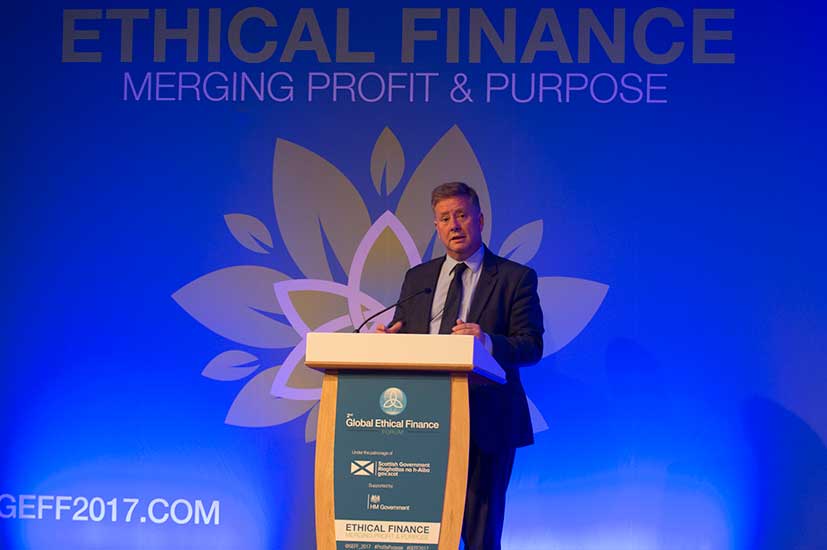A packed audience of over 300 key ethical finance leaders from the Middle East, Africa, East Asia & Europewitnessed path-breaking insights unfold at the 2nd edition of the two-day Global Ethical Finance Forum (GEFF)in Edinburgh on Wednesday September 13.
Reflecting on the aftermath of the global financial crisis and highlighting the need of establishing a sustainable financial system, Keith Brown MSP, Cabinet Secretary for the Economy, Jobs & Fair Work, Scottish Government, said, “In the 10 years following the global financial crisis, there has been something of a re-alignment in attitudes among bankers and investment managers and among customers and shareholders. There has been a recognition that ‘business as usual’ is no longer an option and indeed no longer desirable. A recognition that there could, and should, be a practical, economic alternative to established business practices. Interest in establishing an alternative, sustainable, responsible and ethical financial system continues to grow as does interest in developing a more long-term and responsible form of economic development.
“Despite the challenges which continue to exist within the financial sector in Scotland, and across the world, the industry remains in a strong position and it is crucial that we continue to rebuild its proud legacy and reputation. There is a growing demand for the financial sector to look up to its historic roots in saving, in communities and in sustainable investment and support for businesses.Those roots run deep in Scotland.”
Speaking on behalf of the conference’s Strategic Partner and explaining how Scotland poses as a fitting backdrop to host the narrative due to its strong heritage in ethical finance, Omar Shaikh, Advisory Board Member, The Islamic Finance Council UK (UKIFC) said, “Globally, the city is a leading financial hub and within this, Edinburgh is a key location for asset management and banking. With Scotland’s proud heritage in prudent finance through the mutual life companies, origins of the savings bank movement, I believe that Scotland presents a natural place to convene and host this international dialogue which is pertinent now more than ever.”
Adding further to the rapid rise of Scotland and in particular the Scottish capital as a premier fintech and innovation hub, Frank Ross, The Rt. Hon, Lord Provost & Lord Lieutenant of the City of Edinburgh, in his welcome address, cited, “Edinburgh is not riding the fintech wave, it is driving it.”
However, while the three segments of ethical finance – Socially responsible investing (SRI), Environmental, Social & Governance (ESG)&Islamic/faith-based finance – share the same values-based approach, they are separated by boundaries of geography, perception and methodology.
Stressing on the massive opportunity that lies for mainstreaming ethical finance, Lord Sheikh, The Baron Sheikh of Cornhill, said, “A fundamental part of the UK’s economic success strength stems from bilateral trade. This will be more important than ever before as we embark on a new era for our country post-Brexit. In particular, I believe that we must now seek greater economic and trade ties with our friends from across the globe and forge new trading agreements. In this context, the APPG believes that Islamic and ethical finance can offer a gateway to building new relationships and accessing new markets.”
Explaining how it’s imperative to put ethics at the forefront of businesses and speaking on behalf of the forum’s host Partner, Kirsty Britz, Director of Sustainable Banking, Royal Bank of Scotland, said, “We must keep listening to all our stakeholders. We must work together, to help people make ethical choices with their own money the norm, rather than the exception.”
Following the welcome and keynote addresses was the Plenary Session on the interplay between ethics, faith and finance which witnessed leading experts deliberate on how ethics should redeem its integral role within finance, beyond being just a convenient addendum.
The day started with a host of panel sessions gravitating around the key themes affecting the ethical finance industry at large – these issues comprisedSustainable capitalism, incorporating ESG into faith-based investing, scaling up impact investments, two exclusive case studies delving deep into tracking the growth of responsible investments in Japan & Malaysia and a keynote interview on ethics and morality with Prominent Banker and Business Historian Charles Munn.
Convened by Middle East Global Advisors in strategic partnership with the Islamic Finance Council UK (UKIFC), the Forum is presently being held under the patronage of the Scottish Government, supported by the UK government and hosted by the Royal Bank of Scotland (RBS) at its headquarters in Edinburgh.
Building upon the legacy of the inaugural Forum held in September 2015, the theme for the two-day GEFF 2017 – Ethical Finance: Merging Profit & Purpose– is in line with the Forum’s aspiration to serve as a platform of convergence and collaboration across the responsible finance universe, and to forge a vision for a more inclusive and sustainable financial system.
ALSO READ: ‘Bring back meaningfulness and reputation to the financial sector’

